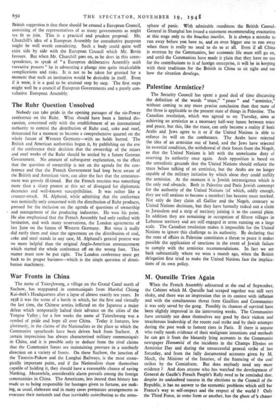The Ruhr Question Unsolved
Nobody can take pride in the opening passages of the six-Power conference on the Ruhr. What should have been a limited dis- cussion, concerned only with the establishment of an international authority to control the distribution of Ruhr coal, coke and steel, threatened for a moment to become a comprehensive quarrel on the whole future of Western Germany—with no holds barred. The British and American authorities began it, by publishing on the eve of the conference their decision that the ownership of the mines and steel works of the Ruhr should be settled by a future German Government. No amount of subsequent explanation, to the effect that the question of ownership is not on the agenda for the con- ference and that the French Government had long been aware of the British and American view, can alter the fact that the announce- ment was grossly ill-timed. But the French reaction was something more than a sharp protest at this act of 'disregard for diplomatic decencies and well-known susceptibilities. It was rather like a counter-attack. M. Alphand, while admitting that the conference was nominally only concerned with the distribution of Ruhr products, pressed for the inclusion on the agenda of questions of ownership and management of the producing industries. He won his point. He also emphasised that the French Assembly had only ratified with hesitation, and with many reservations, the London agreements of last June on the future of Western Germany. But since it really did ratify them and since the agreement on the distribution of coal, coke and steel stands in any case, M. Alphand's general protest was no more helpful than the original Anglo-American announcement which started the whole conference off on the wrong foot. This matter must now be put right. The London conference must get back to its proper business—which is the single question of distri- bution machinery.


































 Previous page
Previous page